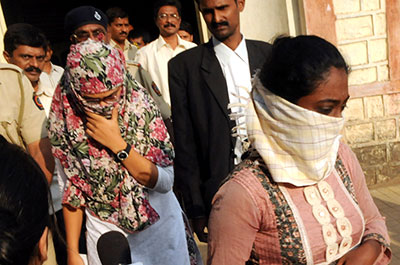The arrest of two women in India this week because of posting and “liking” an opinion on Facebook has further inflamed debate over the right to freedom of expression in the world’s largest democracy.
Following the weekend death of ultra-nationalist politician Bal Thackeray, bustling Mumbai came to a standstill as many government offices, businesses, and schools were closed in a shutdown known as a bandh. As the citizens across the country debated whether the shutdown was justified, 21-year-old Shaheen Dhada posted on Facebook, “People like Thackeray are born and die daily and one should not observe a bandh for that.” Her friend, Renu Srinivasan, “liked” the comment. When a leader of the Thackeray’s right-wing Shiv Sena party, Bhushan Sankhe, complained, both women were arrested, according to local media.
According to news reports, the women were charged under a range of offenses, including section 505(2) of the Indian Penal Code, which criminalizes acts creating or promoting enmity, hatred, or ill-will between classes, section 295(A) for hurting religious sentiments, and section 66(A) of the amended Information Technology Act, 2008, which bans electronic messaging that is “grossly offensive or has a menacing character.” Both women were eventually released on bail and have apologized, according to news reports.
“We are apologizing just to keep everything in place. We don’t want any violence. We want ourselves and our families to be safe,” Dhada told the CNN-IBN television channel.
India has the third most Facebook users in the world with over 60 million, according to Socialbakers, a London-based social media analytics firm. By 2015, the country will have more Facebook users than any other, according to Bloomberg Businessweek. In this context, freedom of expression advocates have raised concern over laws such as the IT Act and spurred debate over who is responsible for policing Internet content.
The women’s arrests are the latest example of intolerance in India for criticism of the government or political figures. In September, cartoonist Aseem Trivedi was arrested on charges of sedition and jailed for allegedly mocking Indian national symbols in his efforts to highlight rampant corruption. Trivedi was released on bail and the sedition charge was dropped, but he still faces other charges. In October, businessman Ravi Srinivasan was arrested for a tweet in which he criticized the son of India’s Finance Minister P Chidambaram. He was released on bail but faces up to three years in prison if convicted, The Hindu reported.
In a letter to the Chief Minister of Maharashtra state, the chairman of the Press Council of India and former judge of the Indian Supreme Court Markandey Katju sharply criticized the women’s arrests. “We are living in a democracy, not a fascist dictatorship,” he wrote. #Freethegirls trended on Twitter as users expressed outrage over the arrests.
Thackeray, whose party and allies have been in power in Mumbai for 16 years, was a polarizing figure. His tough talk and nationalist ideology drew admirers, but he also drew sharp criticism for his professed admiration for Adolf Hitler, his berating of Indian women for wearing jeans, and his admonishment of youth celebrating Valentine’s Day–as well as his incitement to violence against Muslims and migrant workers. An inquiry led by two retired judges into riots in 1992–in which more than 1000 people, most of them Muslims, were killed–determined that Thackeray and his followers had provoked the unrest, but he was never prosecuted, according to The New York Times.
In response to the Facebook posts, Shiv Sena party members and supporters attacked the orthopedic clinic of Dhada’s uncle, according to local media reports. Ten arrests were made today relating to that attack, according to local media. The party supported the arrests, with leader Sanjay Raut saying, “Such people should not live in Maharashtra.”
